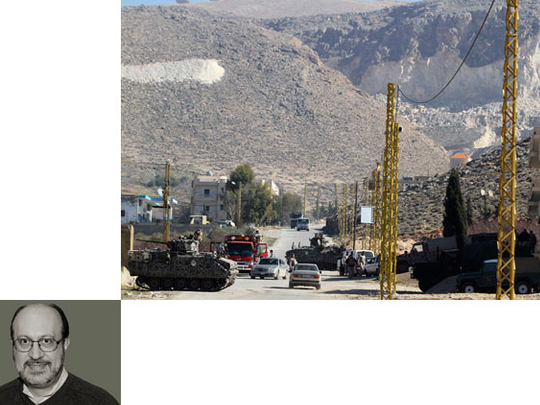
Few doubt the spillover effects of the Syrian crisis on Lebanon. Even fewer deny that the country suffers from lingering consequences of its long and still unresolved civil war (1975-90). And to say that Beirut displays serious misgivings about its political identity would indeed be an understatement.
Regrettably, from Arsal in the North to Naqurah in the South, the Lebanese continue to find killings entertaining, oblivious to manipulations galore. Unmindful politicians grapple with antiquated electoral laws to preserve turfs as everyone is motivated by putative financial gains. Even representatives of the allegedly independent judiciary are mired in controversies that surpass narrow viewpoints, as beholden prosecutors conspire to weaken one of the few beacons of hope still standing in a republic where freedom survives, against all odds.
Yet, liberty itself is under assault, as the sacrosanct freedom of speech that distinguishes Lebanon from its neighbours, is now routinely trampled upon.
A few days ago, Wissam Sa’ade, a journalist working for the daily Al Mustaqbal while holding an adjunct professorship in the department of political science at the Université Saint-Joseph, became the latest victim of a new regime at Beirut’s Rafik Hariri International Airport.
The ugly mishap, perhaps the most revolting form of censorship, focused on books that were in Sa’ade’s bags. Scanned and inspected under a practice that came into effect about five months ago, the procedure interrogated passengers about any books or electronic gadgets they carried, under orders from the Directorate of General Security (Al Amn Al Aam) led by Major General Abbas Ebrahim.
In this instance, the complete works of Rifa’at Al Tahtawi, the renowned Egyptian father of the Arab Renaissance and author of the seminal An Imam In Paris written upon Tahtawi’s return from the French capital in 1831, were duly “discovered”.
The zealous customs officer asked Sa’ade why he possessed the books and, even worse, apparently asked whether he had secured permission from the Security Directorate to bring the books into Lebanon. He then argued with the journalist, even questioning the quantity of books carried, which apparently “exceeded what was allowed”.
The fact that the individual was a university professor, writer and journalist, were pedantic concerns to an anxious officer concerned about dangerous ideas that threatened his skewed visions of liberty.
Sa’ade, who wrote an open letter to Interior Minister Marwan Charbel to formally lodge a complaint and seek an explanation for the officer’s advocacy, did not inquire whether the executor or, for that matter the affable minister, knew who Al Tahtawi was and what he represented in contemporary Arab history. Rather, he simply inquired whether Beirut now sported new regulations against intellectual property, and whether any book or DVD that passed through the airport necessitated a certificate from the Security Directorate.
“What happened with me is unacceptable,” wrote Sa’ade in his letter to Charbel, insisting that it was his “wish that those who want to stick their noses in a suitcase at least knew who [men like] Rifa’at Al Tahtawi” were.
He also ensured that his missive was made public, which drew support from the Association of Violence Against Journalists, as well as numerous social networks. For its part, the Security Directorate rejected any complicity to deny the writer his rights, calling on “journalists to ensure the veracity of facts before posting them”.
Although the Sa’ade incident was resolved after he was allowed to proceed, many of Lebanon’s censorship practices dated from the 1960s, when religious topics and especially sexually explicit fare were routinely banned. Materials on Israel were also scrutinised, newspaper articles or encyclopedia pages torn or blackened, and books or movies simply forbidden.
The 1973 movie Jesus Christ Superstar, which was based on the 1971 hit rock opera by Andrew Lloyd Webber, was duly barred by then Interior Minister Bashir Al Awar under clerical pressure.
More recently, government censors objected to a single scene in Beirut Hotel, a fictional film by Danielle Arbid, which made a reference to a USB memory stick with documents on it about the 2005 assassination of Rafik Hariri.
The Sa’ade encounter was thus not an isolated incident, but an illustration in a long-lasting performance. Nor was it the work of a rogue officer eager to police ideas in a country that is seldom short of controversy and where men and women spilled blood to preserve liberty.
The mere fact that anyone could even think that “any book or record should obtain prior permission to enter Lebanese territory”, was deeply offensive, since the country was and remains a beacon of intellectual freedom in the region. Not only do such actions undermine Lebanon’s reputation and its undisputable cultural mission, there is something intrinsically wrong when an officer audaciously informs a passenger that he will need permission for every single book.
Beirut was duty-bound to quickly retrain its Security Directorate officers who welcomed passengers at its premier international gateway. It should use its scanners to detect bombs because arbitrary decisions to forbid intellectual materials were unbecoming. Censorship is a revolting phenomenon anywhere, but especially in a multicultural society that values liberty. By targeting writers, journalists, or artists in the name of security, Lebanese authorities fall into an abyss from which no one will emerge intact.
Dr Joseph A. Kechichian is the author of Legal and Political Reforms in Saudi Arabia.








